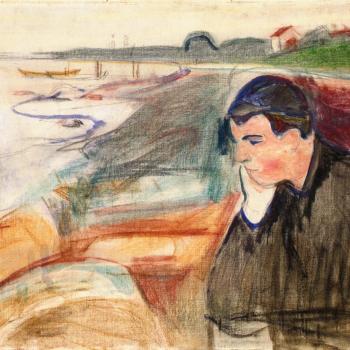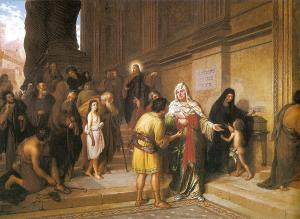That is but one example of a refusal to think historically about terms. Now, let us turn to a liturgical-historical term (after all, Traditionalism is primarily a liturgical and theological idea, though one often connected to a political project).
“Novus Ordo.” This is a term I use a lot because it has real content: the New Mass, the Mass of Paul VI, the thing most Latin Catholics attend every Sunday. In this sense, it’s a bit trickier than “Cultural Marxism” because it has an obvious, concrete referent in the world. Though again, the web of associations often pregnant in its use must be examined.
Not rarely, I find myself on the internet, reading something by a Traditionalist of the stripe in question, and I come across the argument that “Vatican II ruined everything.” The Council is merely pastoral, wholly invalid; whatever the case may be, its institution of a new liturgy is the rotten fruit of an insidious corruption of the Church.
But here, again, history is ignored.
I am a Byzantine and so the question of the Novus Ordo is neither here nor there for me. Let it be known, however, that, if I must attend a Roman Catholic liturgy, I prefer a High Mass to a standard Novus Ordo (though I likely prefer a good Novus Ordo to a Latin Low Mass). My enemy here is not liturgical renewal. I have much love for the monks of Silverstream Priory and Stift Heiligenkreuz.
Rather, what must be questioned is the idea that decay can be linked so squarely to Vatican II and the Novus Ordo more particularly. So many seem to speak as if mere liturgical renewal would mean the revitalization of the Church, the filling of pews. This is historical amnesia of a particularly-sad sort.
Vatican II was a response—call it the wrong one if you’d like—to a changing world, a world that was already pressuring religious institutions across the West. There is the fairly-slow movement by the 19th-century Church to address the antagonism developing between bosses and workers, merchants and farmers. Behind this there is the emergence of Enlightenment institutions within “Catholic” lands, the creeping in of “new” ideas into old Catholic brains: the French Revolution but also the less-obvious machinations of Joseph II and the creeping spread of usurious banking along with the transformation of Europe’s economic and social structures from the late feudal to the emerging capitalist. There is the response to these issues by Catholic Integralism, which, while effective on some counts, was also, ultimately, unable to stem the tide (though many might still look to it for insights). Here we must ask why it failed, how it failed, and what it can teach today.
I could go on and on, but the point is, I hope, clear enough: the Novus Ordo (for all its issues either in se or in application) is not the issue. At worst, it is a symptom, the transformation of which, while it might assist in revitalization, would amount to little more than a Band-Aid. Its terminological use as a demonization exists to accomplish just that—to demonize, to fail to reckon with the difficulties of history, with the problem of the critical study (à la Adorno, et al.) of social and political institutions that rise up and pass away. History cannot be conceived as a series of mistakes to be corrected; rather, it must be seen as what any good Christian must see it as: Providence, as the unfolding of God’s will in time, a process to be evaluated and understood, and thus reckoned with in concrete detail, ending only with the eschaton. We will never achieve a “perfect moment” in history, but will always be figuring, always reevaluating, always fighting. The medievals understood this: enter Bede, Geoffrey of Monmouth and co.
I leave you, then, with advice and prayers, with, yes, Adorno:
The almost insoluble task is to let neither the power of others, nor our own powerlessness, stupefy us.

















